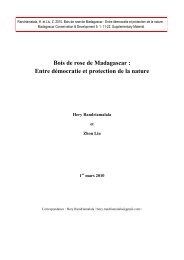Journal Madagascar Conservation - Madagascar Wildlife ...
Journal Madagascar Conservation - Madagascar Wildlife ...
Journal Madagascar Conservation - Madagascar Wildlife ...
Create successful ePaper yourself
Turn your PDF publications into a flip-book with our unique Google optimized e-Paper software.
MADAGASCAR CONSERVATION & DEVELOPMENT VOLUME 3 | ISSUE 1 — DECEMBER 2008 PAGE 11<br />
TABLE 1. List of social conventions and taboos adopted by FIZAMI and FIFAMA Associations for the Manambolomaty Lakes wetland management<br />
Wetlands Management objectives Institutions Description<br />
Regulate resource use and extraction Convention Annually, a total of 400 fishermen from both Associations are allowed to fish<br />
(250 fishermen from FIZAMI and 150 from FIFAMA). Migrants have no right to<br />
fish, but they are allowed to buy and collect dried fish provided they have<br />
collecting licenses issued from <strong>Madagascar</strong>’s National Fishery Department.<br />
Regulate access to resources in time Taboo Annual fishing period is limited from June (coincides with Volambita in<br />
Malagasy moon calendar) to the end of November. The date of opening the<br />
fishing season depends exclusively on the Tompondrano’s decision.<br />
Regulate resource withdrawal methods Convention Fishing nets of 100 m in length and with 3 - finger sized mesh (6 cm) are to be<br />
used during the fishing season. During the closed season, local communities<br />
can fish, but they must use only fishing lines to catch fish for family<br />
consumtion.<br />
nets (> 100 m) with small mesh that were confiscated by both<br />
Associations. The poachers’ main objectives for this unconven-<br />
tional method of taking fish was to use them for the practice<br />
of fish salting to be sold to middle men in Morondava (about<br />
200 km to the south) or in Antananarivo (about 900 km east). In<br />
collaboration with Commune of Trangahy, Soatana village elders,<br />
The Peregrine Fund technicians, Forestry Representatives from<br />
Taboo and Convention The practice of salting fish is traditionally a taboo. With this practice, fishermen<br />
usually use extremely long nets with small mesh.<br />
Convention Live plants can not be used as firewood.<br />
Protect wetlands species in time and space Convention No wild animals can be harvested / hunted in the lakes apart from fish and<br />
Bush pigs (Potamochoerus larvatus) and Common tenrec (Tenrec ecaudatus)<br />
in the forest. Specific emphasis is given to threatened birds species such as<br />
the endangered <strong>Madagascar</strong> fish eagles, Meller’s duck Anas melleri and<br />
<strong>Madagascar</strong> crested ibis Lophotibis cristata; as well as the endangered<br />
<strong>Madagascar</strong> big-headed turtle Erymnochelys madagascariensis (TPF and DWCT<br />
2003). All lemur species are banned from hunting. Concerning tree species,<br />
emphasis is given to those species that have commercial value (e.g. Dalbergia<br />
sp.) or cultural (e.g. Hazomalania voyroni).<br />
Regulate withdrawal of vulnerable life history<br />
stages of species<br />
Preserve wetland integrity and beauty for<br />
future generations<br />
Year Fishermen (numbers) Opening fishing season<br />
(FIZAMI/FIFAMA)<br />
Convention Common tenrecs that are pregnant or with young are prohibited to be hunted.<br />
In contrast, the introduced and destructive Bush pig can be hunted during all<br />
life stages throughout the year.<br />
Convention It is prohibited to exploit or practicing slash - and - burn agriculture within the<br />
forest managed by the Associations.<br />
Convention Fishermen camps are limited to eight specific sites authorized by the<br />
Associations to minimize their impact and disturbance on the wetland<br />
ecosystems.<br />
Convention Burning forest habitat for any reasons is banned.<br />
Taboo Transporting live charcoal embers on the water, relieving ones ‘needs’ in the<br />
water and as well as bringing women to the islands such as Nosy Sarotsy,<br />
Rehampy and Nosindambo are taboos.<br />
Antsalova and the FIFAMA Association has controlled Ankerika<br />
Lake. On 11 August 2005 at a clandestine camp at Betangiriky<br />
one person was caught preparing salted fish. This person’s illegal<br />
net was burned by the Association’s resource controllers on<br />
13 August 2005 so he couldn’t reuse it. One month later, this<br />
person paid his traditional fine of one zebu cow and 20 liters<br />
of rum to the FIFAMA Association. However, in the same year,<br />
TABLE 2. The number of fishermen, fishing season opening and closing dates and fish yields at the Manambolomaty Lakes site from 2002 to 2007<br />
(* Only from Soamalipo/Befotaka in the FIZAMI. Drought affecting the Antsalova region in 2004 may have impacted the fish harvest; †: Regional drought<br />
was also coincided with the death of Ankerika Tompondrano in earlier January 2005; - Data deficiency)<br />
Season closes for both Associations Fish yield (tons)<br />
2002 196 - 30 November 2002 93<br />
2003 266 - 30 November 2003 89<br />
2004 262 (8 June 2004 /-) 30 November 2004 116<br />
2005 213* (28 June 2005 / 12 August 2005) 30 November 2005 34†<br />
2006 265 (23 June 2006/11 August 2006) 30 November 2006 67<br />
2007 298 (2 June 2007 / 08 June 2007) 30 November 2007 200



